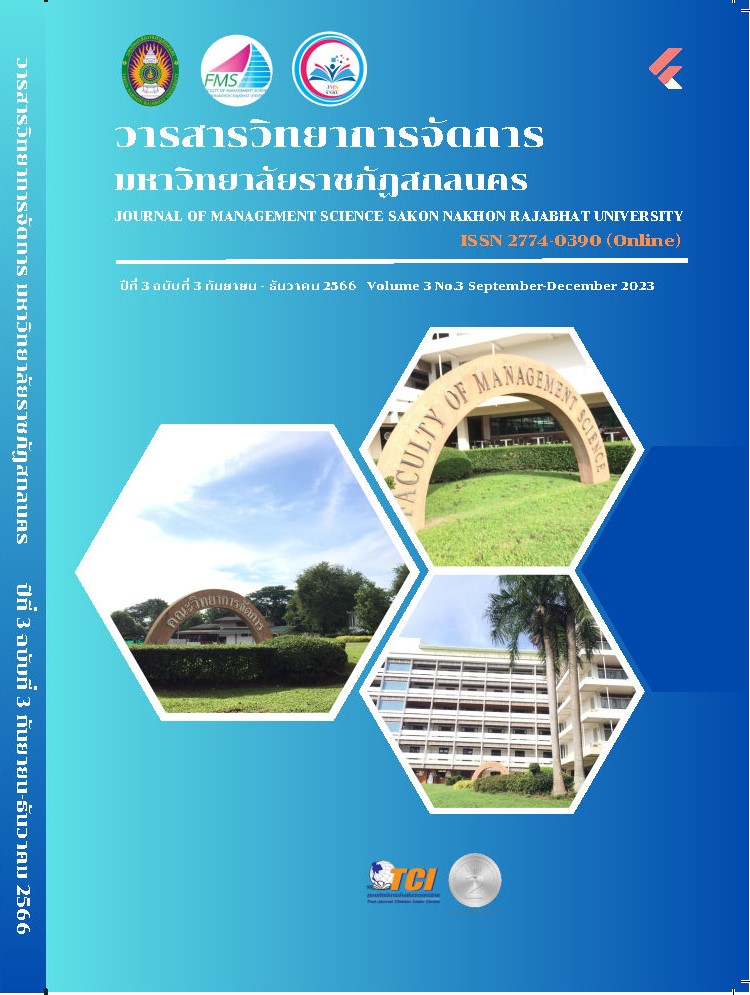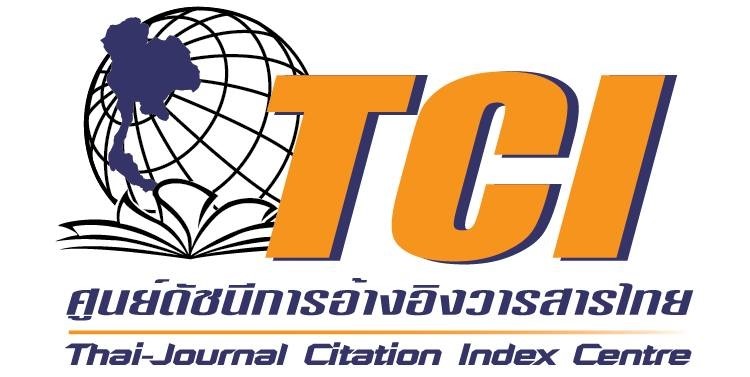การสร้างและการพัฒนากรอบแนวคิดเชิงทฤษฎี
คำสำคัญ:
การสร้าง; การพัฒนา; กรอบแนวคิดเชิงทฤษฎีบทคัดย่อ
กรอบแนวคิดเชิงทฤษฎีเป็นเครื่องมือจัดระเบียบภาพและแผนที่ความคิดที่ช่วยให้นักวิจัยเอาชนะความสับสนทางความคิดในงานวิจัยทางสังคมศาสตร์ซึ่งทำหน้าที่เป็นคู่มือในการกำกับและแนะนำการวิจัยโดยการสรุปความจำเป็นวัตถุประสงค์ธรรมชาติและขอบเขตของการวิจัย ซึ่งมีความสำคัญอย่างยิ่งในการวิจัยเชิงคุณภาพ ให้ความเข้าใจและแนวทางปฏิบัติสำหรับนักวิจัยในการเตรียมแผนงานวิจัย อย่างไรก็ตาม กระบวนการสร้างและพัฒนากรอบแนวคิดเชิงทฤษฎีสามารถดำเนินการตามขั้นตอนดังนี้ (1) การกำหนดประเด็นวิจัย (2) การศึกษาวรรณกรรม (3) การเลือกและกำหนดกรอบแนวคิดเชิงทฤษฎี (4) การระบุตัวแปร (5) การสร้างแบบจำลอง (6) การกำหนดสมมติฐานหรือคำถามการวิจัย (7) การตรวจสอบและปรับปรุง (8) การใช้ประโยชน์จากกรอบแนวคิด (9) การพัฒนาแนวคิด และ (10) การสรุปเรียบเรียงเป็นกรอบแนวคิดเชิงทฤษฎี
เอกสารอ้างอิง
Aljanaideh, K.F., & Diversi, R. (2019). Errors-in-Variables Identification of Composite Noncausal-FIR/IIR Models with Application to Transmissibility Identification. IEEE 58th Conference on Decision and Control (CDC), Nice, France, 2019, pp. 2690-2695, doi: 10.1109/CDC40024.2019.9030280.
Arastehfar, S., Liu, Y., & Lu, W-F. (2014). A framework for concept validation in product design using digital prototyping, Journal of Industrial and Production Engineering, 31(5), 286302,
DOI: 10.1080/21681015.2014.951407
Aurachman, R. (2021). Teaching conceptual models in engineering research with mathematical model approaches Journal of Physics: Conference Series. 1832 (1), 012054. doi:10.1088/1742-6596/1832/1/012054
Bolade, S., & Sindakis, S. (2020). Micro-Foundation of Knowledge Creation Theory: Development of a Conceptual Framework Theory. J Knowl Econ 11, 1556–1572.
https://doi.org/10.1007/s13132-019-00623-2
Chawla, P.R. (2021). Indian Environment for Entrepreneurship: A Study based on Literature Review. International Research Journal on Advanced Science Hub (IRJASH), 3 (4),18-21.
Damschroder, J.L., Reardon, M.C., & Lowery, C.J. (2020). The Consolidated Framework for Implementation Research (CFIR). Research Papers in Economics (Edward Elgar Publishing)-pp. 88-113.
DOI: https://doi.org/10.4337/9781788975995.00011
De Angelis, H.H. (2021). Theoretical and Methodological Framework In: Archaeology of the Hunter-Gatherers of the Central Mountains of Tierra del Fuego. The Latin American Studies Book Series Springer, Cham. https://doi.org/10.1007/978-3-030-81022-1_3
Delcambre, L.M.L., Liddle, S.W., Pastor, O., & Storey, V.C. (2021). Articulating Conceptual Modeling Research Contributions. In: Reinhartz-Berger, I., Sadiq, S. (eds) Advances in Conceptual Modeling, ER 2021.
Lecture Notes in Computer Science, 13012. Springer, Cham. https://doi.org/10.1007/978-3-030-88358-4_5
Delin, P., Chittleborough, P., & Delin, C. (1994). What is an assumption? Informal Logic. 16 (2), 115-122. DOI: https://doi.org/10.22329/il.v16i2.2445
Elinaldo Ferreira da Costa, & Arminda Rachel Botelho Mourão. (2020) Validation of a research problem. Braz. J. of Develop.,Curitiba, 6(10), 80962-80978, DOI:10.34117/bjdv6n10-499
Filip, A. (2021). Theoretical and Analytical Framework. In: Eurosceptic Contagion. Springer Series in Electoral Politics. Springer, Cham. https://doi.org/10.1007/978-3-030-69036-6_2
Georgiou, I. (2021). The Literature Review as an Exercise in Historical Thinking. Human Resource Development Review, 20(2), 252–273. https://doi.org/10.1177/15344843211004027
Waldt, G. (2020). Constructing conceptual frameworks in social science research. The Journal for Transdisciplinary Research in Southern Africa (AOSIS). 16 (1), 9. https://doi.org/10.4102/td.v16i1.758
Guntur, G. (2019). A conceptual framework for qualitative research: a literature studies. Capture : Journal Seni Media Rekam. 10 (2), 91-106, DOI: https://doi.org/10.33153/capture.v10i2.2447
Hara, H., Yugami, N., & Yoshida, H. (1992). An assumption-based combinatorial optimization system. Proceedings Eighth Conference on Artificial Intelligence for Applications, Monterey, CA, USA,, pp. 120-126, doi: 10.1109/CAIA.1992.200019.
Heale, R,& Noble, H. (2019). Integration of a Theoretical Conceptual Framework into your research study. Evidence-Based Nursing (Royal College of Nursing). 22 (2), 36-37. http://dx.doi.org/10.1136/ebnurs-2019-103077
Jonsson, B., Tsay, YK. (1995). Assumption/guarantee specifications in linear-time temporal logic (extended abstract). In: Mosses, P.D., Nielsen, M., Schwartzbach, M.I. (eds) TAPSOFT '95: Theory and Practice of Software Development. CAAP 1995. Lecture Notes in Computer Science, vol. 915. Springer, Berlin, Heidelberg. https://doi.org/10.1007/3-540-59293-8_200
Kreiberg, D., Söderström, T., & Fan, Y-W. (2016). Errors-in-variables system identification using structural equation modeling. Automatica, 66, April 2016, Pages 218-230, https://doi.org/10.1016/j.automatica.2015.12.007
Lai, W-F. (2019). Chapter 1 - Theoretical Conceptual Frameworks for intervention development. Delivery of Therapeutics for Biogerontological Interventions, Academic Press, 3-11, https://doi.org/10.1016/B978-0-12-816485-3.00001-5.
Leelitthum, C., Sintanakul, K., & Nilsook, P. (2019). Conceptual Framework for the Development of a Professional Assessment System in Accordance with Professional Standards in the Business Computer Department," International Journal of e-Education, e-Business, e-Management and e-Learning. 9 (3), 220-226, 2019. doi: 10.17706/ijeeee.2019.9.3.220-226.
Leitão, J. (2019). Theoretical Conceptual Framework and Proposed Model. In: Open Innovation Business Modeling. Contributions to Management Science. Springer, Cham. https://doi.org/10.1007/978-3-319-91282-0_1.
Li, T., Hu, K. (2021). Theoretical Conceptual Framework and Methodology. In: Reappraising Self and Others. Corpora and Intercultural Studies, vol 6. Springer, Singapore. https://doi.org/10.1007/978-981-15-9488-5_3.
Lindgreen, A., Di Benedetto, A.C., Brodie, J.R., Jaakkola, E.. 2021. How to develop great conceptual frameworks for business-to-business marketing. Industrial Marketing Management. 94, A2-A10. https://doi.org/10.1016/j.indmarman.2020.04.005
Liu, L., Zhang, M., & Xu, T. (2020). A conceptual framework and implementation tool for land use planning for corridor transit oriented development, 107, 102939, https://doi.org/10.1016/j.cities.2020.102939.
Lorenz, M.W., & Abdi, N.A., Scheckenbach, F. & et al. (2017). Automatic identification of variables in epidemiological datasets using logic regression. BMC Med Inform Decis Mak 17, 40. https://doi.org/10.1186/s12911-017-0429-1.
Lynch, J., Ramjan, L., & Glew, P., & et al. (2020) How to embed a conceptual or Theoretical Conceptual Framework into a dissertation study design. Nurse Researcher. doi: 10.7748/nr.2020.e1723.
MacGillivray, S. (2021). Reviewing the Literature. In: Sixsmith, A., Sixsmith, J., Mihailidis, A., Fang, M.L. (eds) Knowledge, Innovation, and Impact: A Guide for the Engaged Health Researcher. International Perspectives on Social Policy, Administration, and Practice. Springer, Cham. https://doi.org/10.1007/978-3-030-34390-3_22.
McFarland, J., & et al. (2016). A conceptual framework for homeostasis: development and validation. Advances in Physiology Education (American Physiological Society). 40 (2), 213-222. https://doi.org/10.1152/advan.00103.2015.
Melo, L.B. (2020). The Problem of the Research Problem: Flipping the Scientific Methodology Classes, XV Conferencia Latinoamericana de Tecnologias de Aprendizaje (LACLO), Loja, Ecuador, 2020, 1-7, doi: 10.1109/LACLO50806.2020.9381168.
Mityagin, S.A., Vlasov, V., Tikhonova, O., Rudicova, L., & Repkin, A.I. (2020). City Information Modeling: Designing a Conceptual Data Model. In: Chugunov, A., Khodachek, I., Misnikov, Y., Trutnev, D. (eds) Electronic Governance and Open Society: Challenges in Eurasia. EGOSE 2020. Communications in Computer and Information Science, vol 1349. Springer, Cham. https://doi.org/10.1007/978-3-030-67238-6_16.
Mugizi, W. (2019). Constructing a Conceptual Framework for Quantitative Data Analysis in Social Science Research. Interdisciplinary Journal of Education, 2(1), 74–88. https://doi.org/10.53449/ije.v2i1.77.
Naegele, G., & Hess, M. (2020). Social inequalities in realising extending working lives - EXTEND`s conceptual framework. In: Naegele, G., Hess, M. (eds) Alte und neue soziale Ungleichheiten bei Berufsaufgabe und Rentenübergang. Dortmunder Beiträge zur Sozialforschung. Springer VS, Wiesbaden. https://doi.org/10.1007/978-3-658-31663-1_2.
Ngulube, P., 2018. Overcoming the Difficulties Associated With Using Conceptual and Theoretical Conceptual Frameworks in Heritage Studies. Handbook of Research on Heritage Management and Preservation. DOI: 10.4018/978-1-5225-3137-1.ch001.
Nirmalasari, L., Harahap, E. P., & Faradilla, F. (2018). Implementation of Problem Formulation Management in Improving the Quality of Research in Higher Education. APTISI Transactions on Management (ATM), 2(1), 20–27. https://doi.org/10.33050/atm.v2i1.781.
Oyediran, K.K. (2019). Understanding problem identification in research using analogies. African Journal of Educational Studies in Mathematics and Sciences (Faculty of Science Education, University of Education, Winneba). 15 (2), 35-42, DOI:10.4314/ajesms.v15i2.3.
Parajuli, J. P. (2020). Significance of Literature Review in the Research of Social Sciences. Journal of Population and Development, 1(1), 96–102. https://doi.org/10.3126/jpd.v1i1.33108.
Peter van Rijn, H-J., Moore, C.J., Bauer, I.M., Pressler, Y., & Yestness, N. (2019). A validation framework for science learning progression research, International Journal of Science Education, 41(10), 1324-1346, DOI: 10.1080/09500693.2019.1606471.
Sahu, A., & Chowdhury, A.S. (2019). A Graph-Theoretic Framework for Summarizing First-Person Videos. In: Conte, D., Ramel, JY., Foggia, P. (eds) Graph-Based Representations in Pattern Recognition. GbRPR 2019. Lecture Notes in Computer Science, 11510. Springer, Cham. https://doi.org/10.1007/978-3-030-20081-7_18.
Schwörer, J. (2021). Theoretical-Conceptual Framework. In: The Growth of Populism in the Political Mainstream. Springer Series in Electoral Politics. Springer, Cham. https://doi.org/10.1007/978-3-030-72449-8_2.
Shoket, M. (2014). Research Problem- Identification and Formulation. International Journal of Research. 1 (4), 512-518.
Thomas, C.G. (2021). The Literature Review. In: Research Methodology and Scientific Writing . Springer, Cham. https://doi.org/10.1007/978-3-030-64865-7_10.
Torres-Rodríguez, A. A., & Monroy-Muñoz, J. I. (2020). El problema de la definición del Problema de Investigación. Boletín Científico De La Escuela Superior Atotonilco De Tula, 7(13), 10-15. https://doi.org/10.29057/esat.v7i13.5265.
Trujillo, J., Davis, C.K., Du, X., Damiani, E., Veda C., & Storey, C.V. (2021). Conceptual modeling in the era of Big Data and Artificial Intelligence: Research topics and introduction to the special issue. Data & Knowledge Engineering, 135,101911, https://doi.org/10.1016/j.datak.2021.101911.
Varpio, L., Paradis, E., Uijtdehaage, S., Young, M., (2020). The Distinctions Between Theory, Theoretical Conceptual Framework, and Conceptual Framework. Academic Medicine 95(7),989-994, DOI: 10.1097/ACM.0000000000003075.
Wang, S. (2020). The Legal Theoretical Conceptual Framework for Market Access of TCMP. In: Market Access of Traditional Chinese Medicinal Product in the EU under WTO Legal Framework. Economic and Financial Law & Policy – Shifting Insights & Values, vol 5. Springer, Cham. https://doi.org/10.1007/978-3-030-52848-5_2.
Wei, H. (2020). The Evolution of Concept-Acquisition based on Developmental Psychology. arXiv: Artificial Intelligence. 26 Nov 2020, https://doi.org/10.48550/arXiv.2011.13089.
Wilsdorf, P., Haack, F., & Uhrmacher, A. M.. (2020). Conceptual Models in Simulation Studies: Making it Explicit," 2020 Winter Simulation Conference (WSC), Orlando, FL, USA, 2353-2364, doi: 10.1109/WSC48552.2020.9383984.
Yusoff, A. (2010). A Conceptual Framework for Serious Games and its Validation. Thesis for the degree of Doctor of Philosophy, University of Southampton.
Zhou, W., Pickett, S.T.A. & McPhearson, T. (2021). Conceptual frameworks facilitate integration for transdisciplinary urban science. npj Urban Sustain 1, 1 (2021). https://doi.org/10.1038/s42949-020-00011-9.
ดาวน์โหลด
เผยแพร่แล้ว
รูปแบบการอ้างอิง
ฉบับ
ประเภทบทความ
สัญญาอนุญาต
ลิขสิทธิ์ (c) 2023 วารสารวิทยาการจัดการ มหาวิทยาลัยราชภัฏสกลนคร

อนุญาตภายใต้เงื่อนไข Creative Commons Attribution-NonCommercial-ShareAlike 4.0 International License.
บทความที่ตีพิมพ์ในวารสารวิทยาการจัดการ มหาวิทยาลัยราชภัฏสกลนคร เป็นทัศนะ ลิขสิทธิ์ และความรับผิดชอบของผู้เขียนเจ้าของผลงาน






